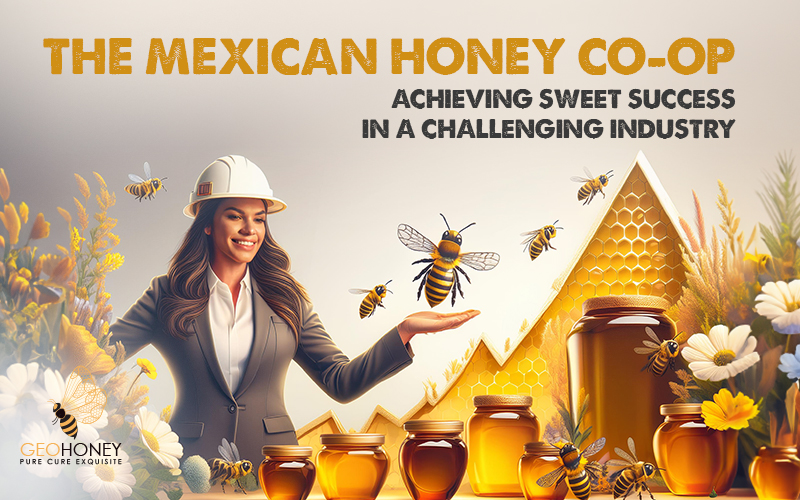- Tokyo: 17:54
- Singapore: 16:54
- Dubai: 12:54
- London: 08:54
- New York: 03:54
The Mexican Honey Co-op Achieving Sweet Success in a Challenging Industry

The Mexican Honey Co-op Achieving Sweet Success in a Challenging Industry
Source: Positive News
The honey industry faces numerous challenges, ranging from climate change to the influx of fake honey. However, one co-op in Mexico is overcoming these obstacles and finding success. Here's a look at how they're achieving this.
Vitaliano Cauich: A Lifelong Passion for Beekeeping
Seventy-three-year-old Vitaliano Cauich has spent over half his life working with bees and holds a deep affection for them. “To me, bees are very important,” he explains. “I enjoy taking care of them. Visiting my apiary daily brings me happiness. Sometimes, even in my free time, I come here just for the smell of the flowers and to see the bees working. It cheers me up to see the wonderful bees working in order.”
In Mexico’s Yucatán peninsula rainforests, beekeeping has been a tradition for Cauich’s ancestors. The Mayan civilizations revered the native Xunan-Kab bee, incorporating them into their rituals and carving them into temple stones. Beekeeping here respects the bees by housing them in small wooden boxes called cajas, where they forage and produce honey at their own pace.
Modern Challenges for Beekeepers
Despite Mexico being the world's fifth-largest honey exporter, modern beekeeping is fraught with difficulties. A 2005 study even suggested that native bees and traditional production methods were nearing extinction. Miguel Ángel Munguía Gil, the general manager at Educe, a co-op focused on high-quality honey production using traditional methods, outlines these challenges: “Pressure on land, fluctuating prices, adulterated honeys, extreme weather, rising production costs, organized crime, and emigration.”
The climate crisis is one of the biggest concerns. The Yucatán peninsula has seen significant changes over the past few decades, with researchers noting an increase in extreme weather events like droughts, hurricanes, and excessive rain. “In the past, there was a clear period when plants and trees flowered,” says Gil. “Nowadays, flowers that were supposed to bloom in February don’t open until June, or not at all. This means no nectar for the bees.”
Combatting Adulterated Honey and Market Volatility
Even conscientious consumers face challenges. A 2023 European Commission survey found that every honey product tested from UK supermarket shelves had been bulked out with sugar syrup. Almost half of all products tested across Europe failed the test. This issue was highlighted in Netflix's docuseries "Rotten," which explored the darker side of food supply chains. Gil emphasizes, “This is something we have to work hard to fight,” as adulterated products impact already volatile prices. This is where co-ops like Educe come in.
Founded in 1997, Educe unites 800 beekeepers across 40 individual co-ops. By working together, they can negotiate better prices without intermediaries taking a cut. They also certify their honey as organic and Fairtrade, which justifies higher prices.
Empowering Communities and Diversifying Products
María Colli, a beekeeper with Educe for four years, shares how the co-op has benefited her community. “The motivation for joining Educe was the price. It’s a good price for us,” she explains. But it’s not just about money. “They give us workshops on gender and the environment. These workshops have opened our eyes. This village has a lot of machismo. It’s a pleasure for me and the other women to have these workshops. We used to be embarrassed to voice opinions, but not anymore.”
Colli has diversified her products, branching out into honey throat sweets, skin creams, and cough sweets. Educe also collaborates with Shared Interest, an ethical investment co-op providing fair-rate capital to smallholders. “The loans we provide to Educe enable them to pre-finance their harvest and give beekeepers year-round payment for their honey,” says Patricia Alexander, Shared Interest’s managing director.
This system allows the cooperative to buy produce from individual producers before selling it to global clients. Surplus profits are returned to farmers for investment, training, and development. Andrés Munguía Zarco, Educe’s treasurer, notes the positive impact: “We see improvements in income for the beekeepers. Many people don’t have to migrate if they can earn a living here. They can stay, keeping families together in their communities.”
Preserving Tradition and Protecting Bees
The threats of extinction feared in the past have not materialised, largely due to co-ops like Educe. For beekeepers like Jorge Alberto Chan López, the cooperative enables them to focus on what matters most: caring for the bees. “We try to keep them as good as possible, to take care of them and not mistreat them,” he says. “They are insects that contribute to our environment and nature.”
In a volatile industry, Educe exemplifies how tradition and cooperation can overcome modern challenges. By supporting beekeepers, empowering communities, and maintaining high standards, they are ensuring the sustainability of beekeeping in the Yucatán peninsula and providing a model for others to follow.



